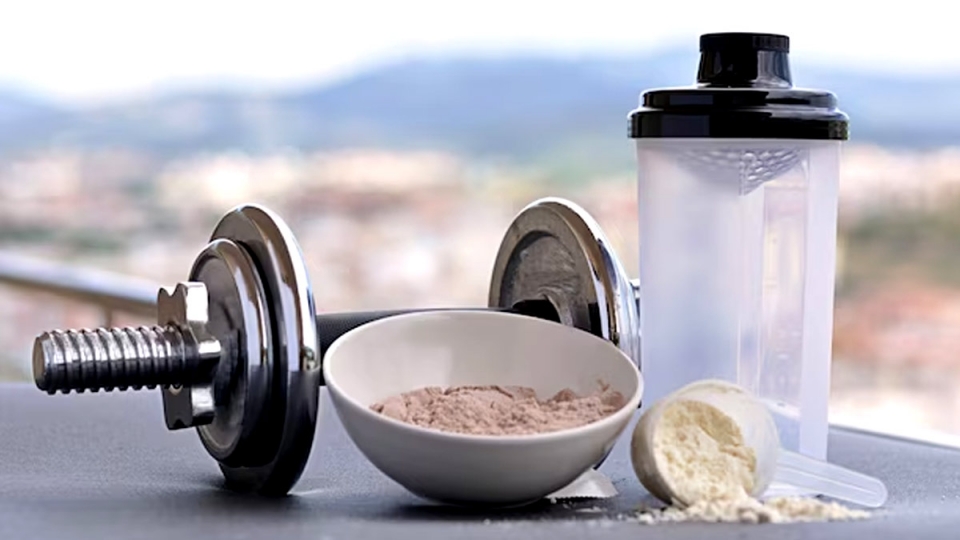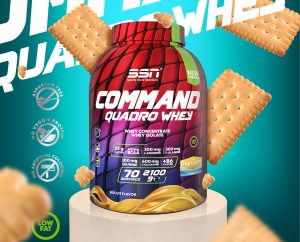Dıetary Supplements And Sport Nutrıtıon
What is Protein Powder and How to Use It Effectively

Protein powder has become a popular dietary supplement among athletes, fitness enthusiasts, and individuals striving to boost their protein intake for various health reasons. Derived from sources like whey, casein, soy, pea, or rice, protein powders offer a convenient way to supplement one’s diet with essential amino acids necessary for muscle building, weight management, and overall health improvement.
Types of Protein Powder:
- Whey Protein: Whey protein, sourced from milk, is known for its rapid absorption rate. It contains a complete profile of essential amino acids, making it highly effective for muscle recovery after intense workouts. Whey protein is typically consumed as a post-workout supplement to aid in muscle repair and growth.
- Casein Protein: Also derived from milk, casein protein is digested more slowly than whey. This slow digestion results in a steady release of amino acids into the bloodstream, which can support muscle recovery over a longer period, such as overnight. Many individuals use casein protein before bedtime to enhance muscle protein synthesis during sleep.
- Soy Protein: Soy protein is a plant-based protein option suitable for vegetarians and vegans. It contains all essential amino acids and is low in fat and cholesterol. Soy protein is beneficial for individuals looking to increase their protein intake without consuming animal products.
- Pea Protein: Another plant-based protein, pea protein is hypoallergenic and easy to digest. It is often preferred by individuals with lactose intolerance or dairy allergies. Pea protein is rich in branched-chain amino acids (BCAAs), which are crucial for muscle repair and growth.
- Rice Protein: Made from brown rice, rice protein is gluten-free and hypoallergenic. While it may not provide a complete profile of essential amino acids on its own, rice protein can still serve as a valuable protein source for those with dietary restrictions or sensitivities.
How to Use Protein Powder:
Protein powder can be incorporated into your daily routine in several ways to maximize its benefits:
- Protein Shakes and Smoothies: Blend protein powder with water, milk, or a milk alternative like almond milk or coconut milk to create a protein shake or smoothie. Add fruits, vegetables, and other ingredients to enhance flavor and nutritional value. Protein shakes are ideal for a quick and convenient post-workout recovery drink or a meal replacement option.
- In Cooking and Baking: Protein powder can be added to various recipes to increase their protein content. Use it in baking recipes such as pancakes, muffins, cookies, and breads to create protein-rich treats. Protein powder can also be mixed into oatmeal, yogurt, or pudding for a nutritious snack option.
- Pre- or Post-Workout Nutrition: Consuming protein powder before or after exercise helps support muscle repair and recovery. Mix protein powder with water or a beverage of your choice and consume it within 30 minutes to an hour of completing your workout. This timing enhances protein synthesis and helps replenish glycogen stores.
- As a Meal Replacement: Protein powder can be used as a convenient meal replacement option, especially when combined with other nutrients like fruits, vegetables, and healthy fats. This helps maintain satiety and supports weight management goals by providing essential nutrients in a balanced form.
- In Snack Bars and Energy Balls: Create homemade protein bars, energy balls, or granola bars by incorporating protein powder into the recipe. These snacks are perfect for on-the-go fuel and provide sustained energy throughout the day.
Important Considerations When Using Protein Powder:
- Dosage and Serving Size: Follow the recommended serving size provided on the protein powder packaging or consult with a healthcare professional or nutritionist for personalized guidance based on your dietary needs and fitness goals.
- Quality of Protein Powder: Choose a high-quality protein powder that is free from additives, fillers, and artificial ingredients. Look for products that are third-party tested for purity and quality assurance.
- Allergies and Dietary Restrictions: If you have allergies or dietary sensitivities, such as lactose intolerance or soy allergies, select a protein powder that aligns with your dietary requirements. There are many options available that cater to specific dietary needs.
Conclusion:
Incorporating protein powder into your diet can be a convenient and effective way to increase your protein intake and support your health and fitness goals. Whether you’re aiming to build muscle, aid in recovery, manage weight, or enhance overall nutrition, protein powder offers versatility and nutritional benefits. However, it’s important to use protein powder as part of a balanced diet and not rely on it as your sole source of protein. Experiment with different types and recipes to find what works best for you and enjoy the benefits of a protein-rich diet.
By understanding the various types of protein powder available and how to effectively incorporate them into your daily routine, you can optimize your nutrition and achieve your health and fitness objectives more efficiently.

Dıetary Supplements And Sport Nutrıtıon
Top 5 Essential Dietary Supplements for Athletes and Their Benefits

Athletes and fitness enthusiasts often turn to dietary supplements to optimize their performance, aid in recovery, and support overall health. These supplements provide concentrated doses of nutrients that may be challenging to obtain through diet alone. Let’s explore five crucial dietary supplements and their specific benefits for athletes in greater detail:
1. Whey Protein
Whey protein stands out as a cornerstone supplement in the fitness world due to its high-quality protein content and rapid absorption rate. It contains all essential amino acids, particularly leucine, which plays a pivotal role in muscle protein synthesis. Athletes use whey protein primarily to support muscle recovery and growth after intense training sessions. Its quick digestion makes it an ideal post-workout supplement for delivering amino acids directly to muscles, promoting efficient recovery and adaptation. Furthermore, whey protein can be utilized throughout the day to meet daily protein needs, supporting muscle maintenance during periods of intense training or calorie restriction.
2. Creatine Monohydrate
Creatine monohydrate remains one of the most extensively studied supplements for enhancing muscle strength, power, and size. It functions by increasing the body’s stores of phosphocreatine, which is used to regenerate ATP during short bursts of high-intensity exercise. By replenishing ATP more rapidly, creatine helps athletes perform better during explosive movements like weightlifting or sprinting. Moreover, creatine supplementation has been shown to reduce muscle fatigue and promote greater training volume, leading to enhanced muscle growth over time. Athletes who incorporate creatine into their regimen often experience improvements in muscle mass, strength gains, and overall athletic performance, making it a valuable addition to their supplement stack.
3. BCAAs (Branched-Chain Amino Acids)
BCAAs, comprised of leucine, isoleucine, and valine, are essential amino acids that play crucial roles in muscle protein synthesis and energy production. They are particularly beneficial for athletes engaged in endurance sports or resistance training. BCAAs can help reduce muscle breakdown during prolonged exercise, accelerate recovery, and support muscle growth. Additionally, leucine in BCAAs stimulates muscle protein synthesis, making it an effective supplement for preserving lean muscle mass and improving overall performance. Athletes often use BCAAs intra-workout or between meals to support muscle recovery and minimize the breakdown of muscle tissue during periods of intense physical activity.
4. Fish Oil (Omega-3 Fatty Acids)
Fish oil supplements are rich in omega-3 fatty acids, specifically EPA (eicosapentaenoic acid) and DHA (docosahexaenoic acid). These essential fatty acids offer numerous health benefits, including anti-inflammatory properties that aid in reducing exercise-induced muscle soreness and inflammation. Omega-3s also support cardiovascular health by lowering blood pressure and triglyceride levels, enhancing blood flow to muscles during exercise. For athletes, these benefits translate into improved endurance, faster recovery times, and better overall performance. Regular supplementation with fish oil can contribute to joint health, cognitive function, and overall well-being, making it an invaluable addition to an athlete’s daily regimen.
5. Multivitamins
Multivitamins provide a comprehensive blend of essential vitamins and minerals that athletes may not consume enough of through diet alone. They are crucial for maintaining overall health, supporting immune function, and optimizing energy metabolism. Athletes have higher nutrient requirements due to increased energy expenditure and metabolic demands. A well-balanced multivitamin can fill nutritional gaps, ensuring athletes have the micronutrients needed for optimal performance and recovery. Key vitamins and minerals such as vitamin C, vitamin D, magnesium, and zinc are particularly important for athletes as they contribute to immune support, bone health, and energy production. Athletes who integrate a high-quality multivitamin into their daily routine often experience improvements in recovery times, overall energy levels, and immune function, helping them stay consistent with their training and performance goals.
Incorporating Supplements Safely and Effectively
While dietary supplements offer benefits for enhancing athletic performance, it’s important to use them judiciously and in conjunction with a balanced diet. They should complement nutritious food choices rather than replace them. Athletes should consult with healthcare professionals or registered dietitians before starting any new supplement regimen, especially if they have existing health conditions or take medications. Professional guidance ensures that supplements are used safely and effectively to support athletic performance, recovery, and long-term health.
Conclusion
Dietary supplements such as whey protein, creatine monohydrate, BCAAs, fish oil, and multivitamins play integral roles in supporting athletic performance, recovery, and overall health. When used strategically and under professional guidance, these supplements can help athletes achieve their fitness goals more effectively. By integrating them into a comprehensive training and nutrition plan, athletes can optimize their physical performance, enhance recovery times, and maintain peak condition throughout their athletic endeavors.
-

 Traınıng Tıps2 yıl ago
Traınıng Tıps2 yıl agoPersonal Trainer Prices and Finding Affordable Private Trainers on Trainerlist
-

 Other Sport Branches2 yıl ago
Other Sport Branches2 yıl agoWhat is a Plank Exercise?
-

 Other Sport Branches2 yıl ago
Other Sport Branches2 yıl agoWhat is a Burpee Exercise?
-

 Other Sport Branches2 yıl ago
Other Sport Branches2 yıl agoBoxing in Canada: History, Famous Boxers, and Trainerlist
-

 Other Sport Branches2 yıl ago
Other Sport Branches2 yıl agoYoga in Canada: History, Famous Practitioners, and Trainerlist
-

 Muscle Buıldıng2 yıl ago
Muscle Buıldıng2 yıl agoHow to Train for Muscle Gain: Effective Workout Tips for Building Muscle
-

 Other Sport Branches2 yıl ago
Other Sport Branches2 yıl agoIce Hockey in Canada: History, Famous Athletes, and Trainerlist
-

 Other Sport Branches2 yıl ago
Other Sport Branches2 yıl agoBasketball in Canada: History, Famous Athletes, and Trainerlist
























